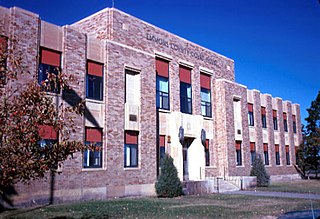
Linton is a city in and the county seat of Emmons County, North Dakota, United States. The population was 1,071 at the 2020 census. When compared with the other 356 cities in North Dakota, Linton ranks in the top twelve percent based on the number of its residents. The city serves as a governmental, commercial and business hub for Emmons County.
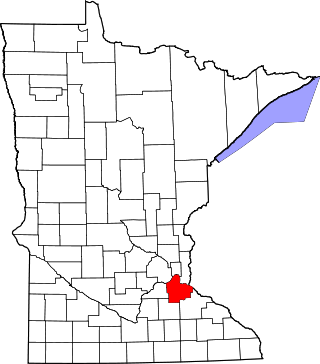
This is a list of the National Register of Historic Places listings in Dakota County, Minnesota. It is intended to be a complete list of the properties and districts on the National Register of Historic Places in Dakota County, Minnesota, United States. Dakota County is located in the southeastern part of the U.S. state of Minnesota, bounded on the northeast side by the Upper Mississippi River and on the northwest by the Minnesota River. The locations of National Register properties and districts for which the latitude and longitude coordinates are included below, may be seen in an online map.

This is a list of the National Register of Historic Places listings in Grand Forks County, North Dakota. This is intended to be a complete list of the properties and districts on the National Register of Historic Places in Grand Forks County, North Dakota, United States. The locations of National Register properties and districts for which the latitude and longitude coordinates are included below, may be seen in an online map.
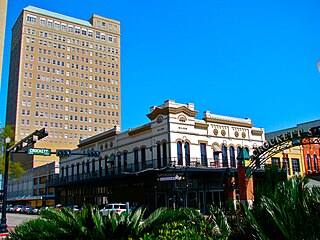
The Beaumont Commercial District is located in Downtown Beaumont, Texas. The district consists of various styles of buildings, including 6 highrises built before 1932. The district is registered on the National Register of Historic Places as a U.S. Historic District. The historic district is roughly bounded by Willow, Neches, Gilbert and Main Streets. The Old Spanish Trail travels through Downtown on Willow, Park, Pearl and College Streets.

The Masonic Block in Fargo, North Dakota, also known as Dakota Business College or Watkins Block, is an Early Commercial style building built in 1884. It was designed by Fargo architects Daniels & Proctor.
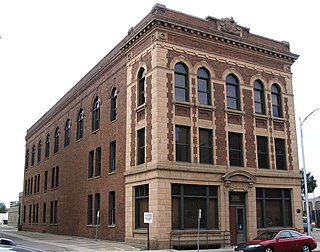
The Grand Lodge of North Dakota, Ancient Order of United Workmen is a building in Fargo, North Dakota, that was built in 1914 in Early Commercial style. It was designed by architects Haxby & Gillespie. Also known as the Fossum Building and as Interstate Business College, it was listed on the National Register of Historic Places in 1979.

Wright Block is a property in Grand Forks, North Dakota that was listed on the National Register of Historic Places in 1982.
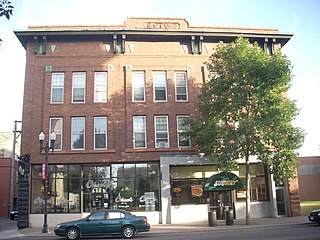
The Stratford Building is a property in Grand Forks, North Dakota that was listed on the National Register of Historic Places in 1982.
Clifford Annex was a building in Grand Forks, North Dakota. It was listed on the U.S. National Register of Historic Places, but was destroyed in the 1997 Red River flood, and was delisted in 2004.
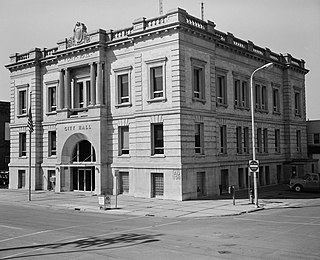
John W. Ross (1848–1914) was the first licensed architect in Grand Forks, North Dakota.
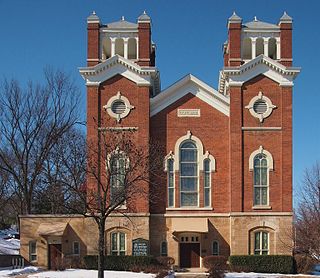
Charles N. Daniels (1828-1892) was an American architect active in Minnesota, North Dakota, and Washington.

Dagen's Grocery, also or formerly known as Ole B. Johnson and Sons Hotel and Store, in Jud, North Dakota, is listed on the National Register of Historic Places. It was built in 1905 and includes Early Commercial architecture. It has served as a post office, as a department store, and as a hotel. The listing included two contributing buildings.
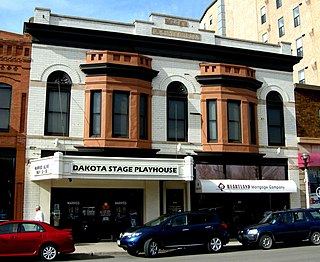
The E. G. Patterson Building at 412–414 Main St. in Bismarck, North Dakota, United States, was built in 1905. It was listed on the National Register of Historic Places in 1982.
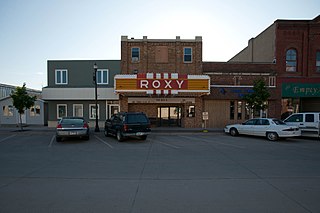
The Roxy Theatre in Langdon, North Dakota, United States, in the center of the Langdon business district, was built in 1936 in Early Commercial architecture. It was listed on the National Register of Historic Places in 1998.

Hotel Berry on W. Central Ave. in Velva, North Dakota, United States, was built in 1906. It was listed on the National Register of Historic Places (NRHP) in 1982. The listing included two contributing buildings.

Mandan Commercial Historic District is a 20-acre (8.1 ha) historic district in Mandan, North Dakota that has work dating to 1884. It was listed on the National Register of Historic Places (NRHP) in 1985. The listing includes 35 contributing buildings and a contributing object.
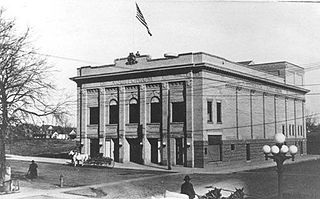
Arthur Wesley Van Horn was a prolific architect of Bismarck, North Dakota. A number of Van Horn's works, alone or as part of his firm, are listed on the U.S. National Register of Historic Places.
The Security State Bank, on Garfield St. in Willow Lake, South Dakota, was built in 1909. It was listed on the National Register of Historic Places in 2002.

The Alonzo Ward Hotel is a historic hotel in Aberdeen, South Dakota. It is individually listed on the National Register of Historic Places and is a contributing property to the Aberdeen Commercial Historic District.
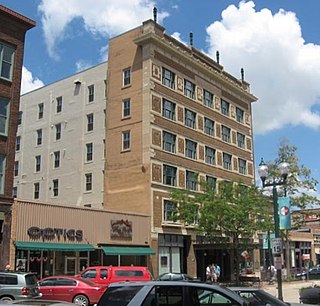
The Carpenter Building, historically the Carpenter Hotel or Hotel Carpenter and known colloquially as The Carpenter, is a historic building at 221 South Phillips Avenue in downtown Sioux Falls, South Dakota. Originally serving as a hotel from 1912 to 1966, it is now used for retail and apartment space. It was listed on the National Register of Historic Places in 1986.





















